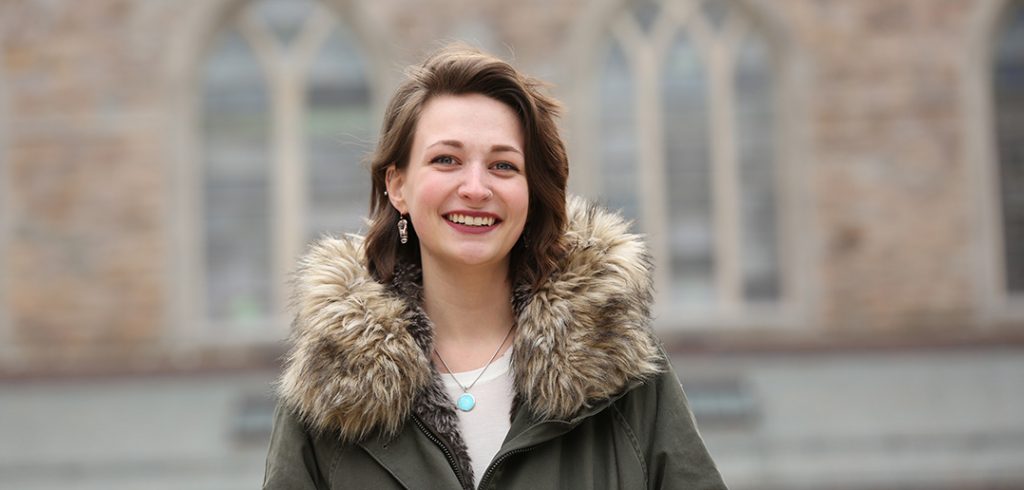Fordham senior Kaitlyn Lyngaas recalls a curious comment Joseph M. McShane, SJ, made during her first days at Fordham four years ago. “A Fordham education should leave you bothered,” the University’s president told freshmen.
At the time, Lyngaas envisioned a Fordham education as a means to an end: a comfortable medical career. Instead, the Illinois native has spent her undergraduate years grappling with thorny and complicated issues of international poverty and justice. She is spending her senior year working with refugees and writing a thesis on the treatment of children in the immigration court system.
“I think Fordham completely changed my vision of the world,” she says. “My eyes were opened to all the things happening in the world. It bothered me.”
A class on Latin American history introduced her to imperialism, global poverty, and the need for social change. She wanted to do something. Moral and political questions raised in that course led her to Fordham’s Institute of International Humanitarian Affairs (IIHA), where she interned for several semesters, eventually taking on humanitarian affairs as one of her majors (the other is political science).
“She’s smart, dedicated, really everything you want in a Fordham student,” says IIHA Executive Director Brendan Cahill. “She has intense passion for the world but also compassion for those not as fortunate. It has been wonderful to see her grow at Fordham.”
Lyngaas credits IIHA with exposing her to humanitarian workers from across the globe. At one time, she thought she would become an international aid worker or human rights advocate herself. She interned at Human Rights Watch last summer. But as Lyngaas studied the complexity of mounting a response to crises in foreign countries, particularly those where there is a history of racism and colonialism, she became convinced that she can help best by staying home. “I feel like my voice is best put to use in a culture I do understand. I still have this interaction,” she says, “but in a context more relevant to my experience.”
That’s what led her to Catholic Charities’ Refugee Resettlement program, where she has been part of the response to the primary humanitarian crisis of our day—the mass migration of refugees out of inhabitable and dangerous nations. Lyngaas helps Central American families file paperwork to legally bring to the United States the children they left behind in El Salvador, Honduras, and Guatemala.
In December, the first children arrived. “Seeing the look of relief on their faces, you feel like you are really helping these people,” Lyngaas says.
The Fordham College at Lincoln Center senior also volunteers through Catholic Charities to help recent refugees from all corners of the world construct their resumes—often translating informal work in another country into something that can help people land a job in this one. And she helps the newcomers adjust to life in the United States. There are lessons on cultural norms from the simple to the profound: shaking hands, making eye contact, filing taxes, and the fact that same-sex marriage is legal and polygamy is not.
The education Lyngaas pursued in and out of the classroom has left her unsettled. She’s not exactly sure what she’ll do after graduation, but she knows it will be with people striving for a safe landing, a secure life.
“People are the same wherever they are from,” she says. “They want to be a part of a community. They want to thrive. And they want to better their lives.”
—Eileen Markey, FCRH ’98

